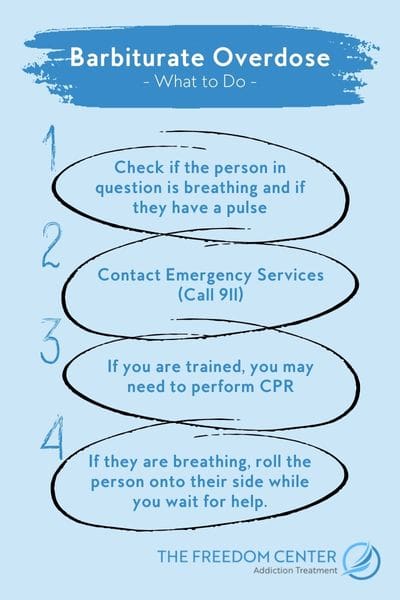Barbiturates are a type of prescription sedative, a class of drugs historically used to treat agitation, anxiety, and insomnia. Although initially believed to be safe, barbiturates have largely been replaced with other medications such as benzodiazepines for treating these symptoms because we now know that barbiturates pose a high risk of addiction and even overdose.
Due to the increased awareness of the risks associated with their use, barbiturates are highly regulated and only occasionally used in controlled medical settings as a sedative or anesthetic prior to surgery. Still, that hasn’t stopped them from being misused by 5.9 million Americans. Barbiturates may not be as common as they once were but abuse, addiction, and overdose does still happen. For this reason, education on what causes barbiturate toxicity, how to identify the signs of abuse or overdose, and what to do in the event of an overdose is critical.
What Is A Barbiturate Overdose?
Also known as barbiturate toxicity, barbiturate overdose is when too great a dose is consumed and it depresses the central nervous system to the point of causing a lack of consciousness, coma, or death.
A barbiturate overdose is most common when these drugs are taken with another drug, specifically another depressant. If something such as alcohol, fentanyl, or another opioid is consumed while barbiturates are in the human body, this cross-drug use can cause the effects of each substance to be amplified. Heart rate and breathing become slowed, which decreases the flow of oxygen to the brain and all other parts of the body. Even a few minutes of oxygen deprivation can cause brain damage, organ failure, and ultimately death.
How Did Jimi Hendrix Die? Barbiturate-Related Asphyxia
Jimi Hendrix is one of the music legends who died all too young. At the age of 27, he was found unresponsive and was unable to be resuscitated. According to Wikipedia, a medical examiner reported high levels of barbiturates in his system. It was later disclosed that he had consumed nine barbiturate sleeping pills (half of a pill is considered a single dose). Jimi Hendrix is arguably the most famous individual to have died from a barbiturate overdose.
The precise cause of Jimi Hendrix’s death is believed to have been asphyxia or asphyxiation as a side effect of an barbiturate overdose. Asphyxia is when abnormal breathing leads prevents sufficient oxygen intake. One possible cause is vomiting while unconscious and aspirating on the vomit (choking). It could also be caused by a depressant effect so great that breathing levels reduce to dangerously low rates, or stop completely. Preventing asphyxiation could greatly reduce the rate of barbiturate-related overdose deaths.
Signs of a Barbiturate Overdose
Ideally, individuals who use barbiturates would use them as prescribed and avoid mixing with other drugs. Unfortunately, abuse, addiction, and overdoses happen. The first thing is to keep an eye out for the signs & symptoms of an overdose:

- Difficulty thinking
- Decreased level of consciousness
- Bradycardia or rapid and weak pulse
- Poor coordination
- Vertigo
- Nausea
- Muscle weakness
- Thirst
- Oliguria
- Decreased temperature
- Dilated or contracted pupils
Treating Barbiturate Overdose
If it seems that someone might be overdosing, contact emergency services immediately. Check if the person in question is breathing and if they have a pulse. If necessary, a trained person can perform CPR or an emergency responder can provide directions on performing this task. If breathing, roll the person onto their side to avoid aspiration and asphyxiation from vomiting. An individual who experiences an overdose maybe end up in a coma and may have brain damage. The length of necessary hospitalization may vary greatly from one person to another.
Even if someone is released from the hospital following an overdose, that does not mean that their recovery is complete. Without proper addiction treatment, the risk of a subsequent overdose is significant. A PHP or IOP program could help address any addiction-related issues that may have lead to the overdose and prevent a future one.
Sources:
https://en.wikipedia.org/wiki/Death_of_Jimi_Hendrix











































